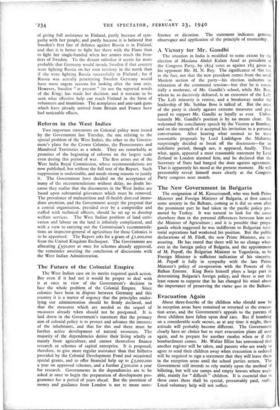Reform in the West Indies
Two important statements on Colonial policy were issued by the Government last Tuesday, the one relating to the special problem of the West Indies, the other to the Govern- ment's plans for the Crown Colonies, the Protectorates and Mandated Territories as a whole. They are remarkable as promises of the beginning of reforms on the largest scale even during this period of war. The first arises out of the West India Royal Commission, whose recommendations are now published, but without the full text of the Report. Such suppression is undesirable, and needs strong reasons to justify it. The Government have decided on the acceptance of many of the recommendations without delay, no doubt be- cause they realise that the discontents in the West Indies are based upon substantial grievances which must be removed. The prevalence of malnutrition and ill-health demand imme- diate attention, and the Government accept the proposal that a central organisation, presided over by a comptroller and staffed with technical officers, should be set up to develop welfare services. The West Indian problem of land culti- vation and labour on the land is infinitely complicated, and with a view to carrying out the Commission's recommenda7 tions an inspector-general of agriculture for these Colonies is to be appointed. The Report asks for a grant of £I,000,000 from the United Kingdom Exchequer. The Government are allocating £350,000 at once for schemes already approved, the remainder awaiting the conclusion of discussions with the West Indian Administration.






































 Previous page
Previous page